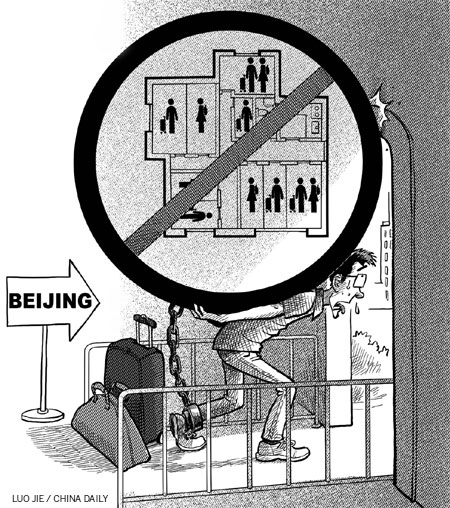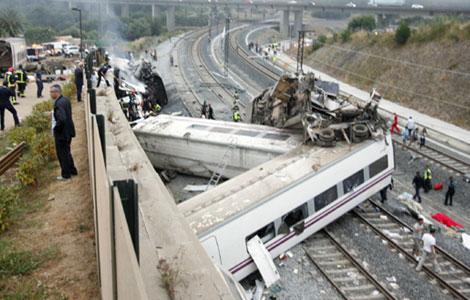More public housing needed
Updated: 2013-07-26 08:35
By Zhang Zhouxiang (China Daily)
|
||||||||

A new regulation, jointly released by several municipal government agencies on July 18, requires that every tenant in Beijing should have a living space of no less than 5 square meters, while no more than two persons can share one room. It is also forbidden to rent kitchens, restrooms, balconies or underground storage rooms to live in. Group renting has long been a problem in Beijing. There was a report in Beijing Daily recently about 25 tenants crowding into an 80-square-meter apartment in Jinsong zone; the distance between beds was only 30 centimeters and the tenants often had to wait in long queues to use the toilet. There have been many similar reports.
Safety can never be ensured in these apartments, and it will be difficult for people to escape if there is a fire. Worse, by dividing one apartment into an astonishing number of small units, the construction structure can be changed, thus threatening the safety of the whole building.
However, can the new regulation effectively put an end to the problem?
Nobody wants to live in a crowded space with nothing but a single bed; people do it because they have no choice facing the high rent. In other words, the tenants have less bargaining power in finding a place to sleep.
Much of the demand for rented accommodation is from fresh graduates, whose average starting salary in Beijing is 4,746 yuan ($773) a month, according to job-hunting website zhaopin.com. In comparison, the average rent for an apartment in Beijing in the first three months of 2013, according to a CCTV report, is 3,660 yuan. Zhang Xu, a market researcher from realty agency Homelink, said that the number in their deals is even higher than 4,000. For most graduates, renting an apartment of their own is beyond their reach, even sharing requires one-third to half of their income.
Zhang also said that the demand is roughly double the supply in rental market, while a survey of on-line agency cityhouse.cn shows that the gap between the price required by house owners and expected by tenants is narrowing; in other words, tenants have increasingly less bargaining power in the market. The rent for every square meter, as the website shows, has risen from 52.34 yuan from one year ago to 60.74 yuan this June.
As a result, those whose income is below average have no choice other than sharing an apartment, even with quite a number of people in some areas with high rent.
There is no confirmed data on the living conditions of group tenants, but a report jointly released by the municipal government and Beijing University of Technology on July 2, found that the average living space of non-local residents was 5.6 square meters. The number of people affected by the new regulation if it is strictly implemented, will be significant.
Therefore, a simple ban alone will not put an end to group renting as for some there is no other option. More measures are needed to help tenants who will be chased out of cheap housing without any other place to go.
As it is not possible to raise the average wage or lower rents significantly, Beijing needs to offer more public housing. For a long time, they were accessible only to those with a local hukou, or local residence registration.
Only one-tenth of fresh graduates have a local hukou.
Even after a regulation in December 2011 made public housing available to those without a local residence registration, the requirements are often prohibitive to those just entering the work force. In Shijingshan district, for example, one has to work within the district for five consecutive years to be able to apply for a public apartment.
The government needs to open the public housing market more and build more housing for low-income residents. It should also offer subsidies to those in need. Preventing people from group renting without offering any alternative will only lead to shanty towns. After all, people need somewhere to live.
The author is a writer with China Daily.
Zhang zhouxiang@chinadaily.com.cn
(China Daily USA 07/26/2013 page16)

 Top DPRK leader meets Chinese vice-president
Top DPRK leader meets Chinese vice-president
 US does not plan decision on Egypt coup
US does not plan decision on Egypt coup
 Bo Xilai indicted for corruption
Bo Xilai indicted for corruption
 Korean War veterans return to peninsula
Korean War veterans return to peninsula
 Tourist safety a priority in S China Sea
Tourist safety a priority in S China Sea
 Death toll in Spain train crash rises to 77
Death toll in Spain train crash rises to 77
 Royal baby named George Alexander Louis
Royal baby named George Alexander Louis
 'The Grandmaster' takes center stage
'The Grandmaster' takes center stage
Most Viewed
Editor's Picks

|

|

|

|

|

|
Today's Top News
Scholars provide a tour 'around the world'
GM says weakness in Asia leads to profit drop
Syrian rebels ask Kerry to send US arms quickly
Flights over sea 'routine training'
US does not plan decision on Egypt coup
Congress approves NSA spying program
Japanese PM unlikely to visit Yasukuni Shrine
Girl, 2, thrown to ground; suspect detained
US Weekly

|

|







